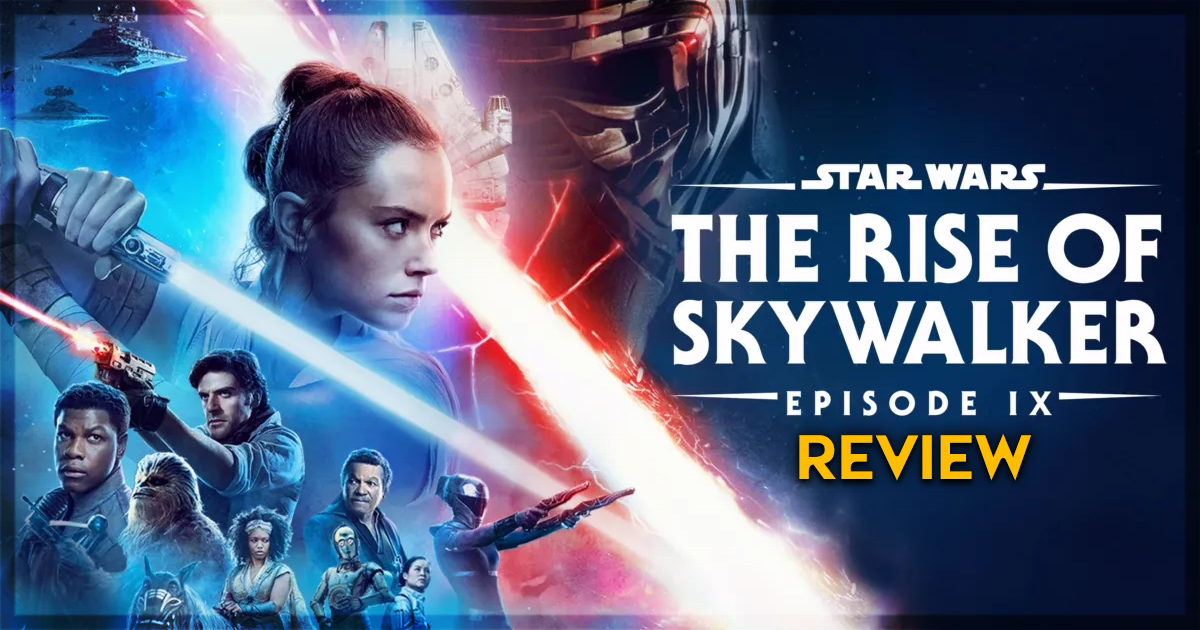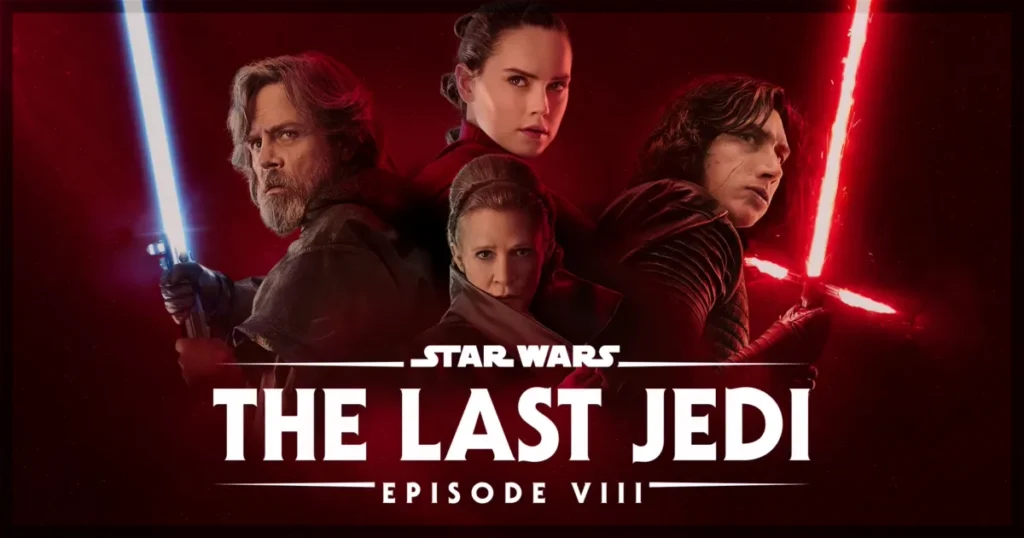2019’s Star Wars: The Rise of Skywalker – the final entry in the Star Wars sequel trilogy – had severe production hurdles from the start. The film was originally going to be helmed by Jurassic World director Colin Treverrow, who had managed to pen a full script with Derek Connolly titled Duel of the Fates. However, creative differences with Disney saw Treverrow replaced in late 2017 by JJ Abrams, returning to the saga after directing The Force Awakens, who started again from scratch. The untimely passing of Carrie Fisher in 2016 also caused issues, as her character was supposed to have a key role, forcing the crew to work around this. Ultimately The Rise of Skywalker had the shortest production time of any mainstream Star Wars film at just over a year, something that unfortunately shows in this disappointingly unimaginative spectacle.
The war between The First Order and the Resistance rages on with an unexpected development. Emperor Palpatine, aka Darth Sidious (Ian McDiarmid) has returned, having survived his apparent death at the end of Return of the Jedi. Sought out by Kylo Ren (Adam Driver), Palpatine offers him the full might of an army he has been secretly building in exchange for the budding Jedi Rey (Daisy Ridley) being brought to him alive. Kylo accepts, but he is still plagued by his internal struggle between the dark and light sides of the Force, even as he seems geared up to conquer the galaxy with Palpatine’s aid.
Meanwhile, Rey is continuing her Jedi training under the watchful eyes of Leia Organa (Fisher), as her allies, Finn (John Boyega) and Poe (Oscar Isaac), conduct guerilla warfare tactics against the First Order. News of Palpatine’s survival reaches the Resistance – the now widely memed line “somehow Palpatine returned” conveying just how underdeveloped this twist is. Consulting the Jedi Texts she stole from Luke Skywalker (Mark Hamill), Rey goes on a quest to locate and destroy Palpatine, with Finn and Poe accompanying her. Their adventure takes them all across the galaxy; from the colourful desert world of Pasaana, to the ruins of the second Death Star, to Exegol, the cold, dark homeworld of the Sith.
Reading the above synopsis gives one an early warning sign into what makes The Rise of Skywalker so frustrating. It is not so much a story of character growth and fighting tyranny as it is an exercise in regressive fan service. Bringing back Palpatine without any explanation and suddenly making him the big bad again is not just baffling – it actively undermines the story. Reducing the film to its skeleton, it tells the tale of younger generation heroes coming together to make their own stand and thus shape the future of the galaxy. Having them fight the big bad of the original Star Wars trilogy ensures that the film is stuck in the past instead of looking to the future, as it was initially conceived to do. Other moments of blatant nostalgic gluttony include a moment of Luke’s force ghost lifting an X-Wing like Jedi Master Yoda (Frank Oz) did in The Empire Strikes Back; the reappearance of fan favourite character Lando Calrissian (Billy Dee Williams) for effectively a glorified cameo, and even the final battle, which amounts to, to paraphrase Palpatine and Rey, all the Sith versus all the Jedi. Candidly, it feels lazy.
Perhaps the worst victim is Rey’s story, as she is shown not to be a powerful nobody as previously revealed but actually the granddaughter of Palpatine. This retconning is bad enough, but it actively reduces Rey’s agency as a protagonist, making her infinitely less interesting. In this film, Rey is defined not by her resilience, smarts or unique ability to channel a balance between the dark and light sides of the Force, but solely by her connection to Palpatine. One could perhaps argue that this creates an arc in which she learns to shape her own identity and thus her own legacy, not becoming defined by her past. However, not only did the previous film, The Last Jedi, already take her on this arc with a much more satisfying resolution, but by making her a Palpatine and then, in the final scene, have her take the name Rey Skywalker, her legacy becomes wholly shaped by the past instead of her own individuality. Daisy Ridley’s performance is admirable, and does well to convey the character’s inner turmoil as she’s faced with this development – and the subsequent conflicts that emerge from it – but Rey’s potential complexity is hollowed and cheapened by this pointless backtracking.
The Rise of Skywalker sees Rey, Finn and Poe, the sequel trilogy’s co-protagonists, all together and going on a macguffin-searching quest, as they attempt to find a way of getting to Exegol. This is the first time in the sequel trilogy that all three are going on an adventure together and the story, however flimsy, does benefit hugely from the charming chemistry between Ridley, Boyega and Isaac. Sadly, Finn and Poe are all but sidelined in the grand scheme of the story. Poe’s new leadership mantle does test him, as he’s more acutely aware of the lives he is in charge of. A stretch of the final battle, where Poe believes he’s led his forces to their deaths, is one of the film’s best moments, elevated by Isaac’s ability to say so much with just facial expressions. But this arc is often buried underneath a sea of comedic quips and nostalgia bait, with the revelation that Poe, played by a Latinx actor, was once a spice runner being somewhat problematic in terms of profiling.
Finn has a handful of cool moments, and is possibly revealed to be Force-sensitive if the editing is anything to go by. But his significance as a character is conveyed through dialogue rather than action. An ex-stormtrooper turned reliable fighter for the Resistance is a fascinating arc, with the potential to go even further if Finn was able to lead other ex-stormtroopers into the fight. There’s even a character called Jannah (Naomi Ackie), who reveals herself and her crew to be ex-stormtroopers inspired by Finn. But as their deprogramming has already happened by the time Finn meets them, his agency is made all but moot. It’s an especially infuriating misfire.
It sucks to see such half-hearted treatments of these characters as the setpieces they are interacting with are generally quite dazzling, a sign of terrific production design. From the colourful flags of the Pasaana village and the lush forest greens of Ajan Kloss, where the Resistance’s main base is located, to the harsh cold greys of Exegol, the visuals pop off the screen with giddy fervour. Perhaps the most impressive sequence involves Rey and Kylo Ren’s final duel on top of the ruins of the Death Star. Not only do Ridley and Driver commit to the fight’s intensity through their visceral expressions and choreography, but the setting evokes ideas of two characters fighting for the future on the literal ruins of the past. It even leads to the film’s best scene, when Kylo Ren finally rejects the dark side forever. The sequence mirrors a moment in The Force Awakens, the last encounter Kylo had with his father, Han Solo (Harrison Ford), with Driver’s tone and mannerisms painting a harrowing picture of the battle going on in Kylo’s mind. John Williams’ score remains consistently awe-inspiring, and while the use of quick cuts (whether to other characters’ actions or a hamfisted joke) does obfuscate these visuals at times, there is still a sense of kinetic intensity to them. For all of its regressive plot points and treatments the film can be exciting on occasion. Carrie Fisher is included via deleted footage from The Force Awakens, and while the uncanny valley between these scenes and that of the other actors is somewhat jarring, it’s at least nice to know that the crew didn’t resort to CGI.
However, what makes the film so disappointing is just how avoidable its ultimate creative hollowness was. Although the film isn’t very good on its own terms, it’s hard to separate it from the climate it was made in. As I mentioned in my previous review for The Last Jedi, despite the mostly positive reactions that film got, the voices of dissent were so irritatingly, and consistently, loud that many characterised The Last Jedi as divisive or controversial when, in reality, it wasn’t. Disney seems to have taken that fandom splinter group’s “criticisms” to heart, trading in the innovation and themes of legacy that the trilogy as a whole seemed to be going for in order to sell a product filled to the brim with fan service. As stressed, callbacks to the original trilogy are in abundance, and many of the things these “fans” moaned about, such as Rey’s parentage, have been retconned into something more personally satisfying to these people but massively less interesting to the overall story. Not only does this limit the personal creativity of the filmmakers – JJ Abrams’ direction, which was once so lively in The Force Awakens, feels like it’s on autopilot here – but it compartmentalises the film into a product that only the most toxic members of the fandom could enjoy; the irony being that most of those same toxic individuals were pre-conditioned to hate this film regardless. In trying to please everyone by giving them a conveyor belt of nostalgia and boring retcons the film ends up pleasing next to no one.
What makes this particularly disheartening is that we have the original Duel of the Fates script – which leaked in early 2020 – to consult, meaning we know what this film could’ve been if Disney had stuck to their guns instead of giving in to an entitled fandom. Duel of the Fates had its issues too – namely its own share of annoying fan service moments – but it was a mostly compelling story of revolution and solidarity, one that was also narratively and thematically consistent with The Force Awakens and The Last Jedi. Its resolutions were much more intriguing, and in line with the legacy thesis, with Rey and particularly Finn getting powerful conclusions to their stories in the leaked script. It may not have been a mind-blowing ending, had it been made, but it would’ve been much more satisfying than the ending we did get.
Star Wars: The Rise of Skywalker is mediocre and uninspired when taken as a film on its own. As a conclusion to the otherwise solid sequel trilogy it’s difficult to envision a blander finale. Where its predecessors were spectacular, even bold at times, The Rise of Skywalker is unimaginative and stuck so rigidly in the past that it forgoes an identity of its own. There’s the odd fun moment, but utterly no chutzpah. Many call it the worst of the Star Wars saga, and there’s definitely a good case for that opinion. Where the Star Wars franchise will go next in terms of cinematic releases is anybody’s guess, but here’s hoping that those in charge learn from the mistakes of The Rise of Skywalker, and stand by their filmmakers rather than try to cater to the worst corners of the internet. You could say it’s our only hope.
2 stars
Star Wars: The Rise of Skywalker is now playing on Disney+.
Learn more about the film, including how to watch, on the Disney+ website.


